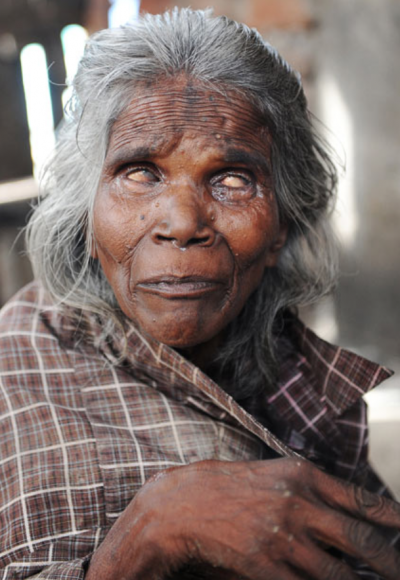Laccho

Laccho-bai sits in the door of her house, cradling a garment that belonged to her daughter. She’s speaking, but what she’s saying, no one can tell. She breaks into song, gives a laugh. Sometimes, she cries.
Hearing our voices, Laccho turns and surveys us with empty eyes, then gives a toothless and unexpectedly sweet smile. To look at her, you would think she was in her eighties, not forty years younger. She’s been thus for years,’ says a neighbour. ‘All day sitting in the doorway, holding that cloth, talking to God or whoever will listen.
Laccho was born in Bhopal in 1958. At 16 she was married to Laxmi Narayan, a hotel waiter. There was never enough money. Laccho earned a few extra rupees rolling leaf cigarettes but the couple were always hungry. Having no money to buy a hut, they built a shack of planks near the fine new American factory that had opened in Bhopal.
Laccho never knew much joy. She lost four children, each at less than a year. Her fifth child, a daughter, was two years old on the venomous night of December 2nd, 1984.
‘On that night there were four of us,’ says her husband. ‘My wife and myself, our little daughter and fate – we all fled together.’
The events of that night have often been described – the screams, panic, street lamps reduced to pinpoints by thick clouds of poison, dying figures stumbling past in a tobacco light – but we can never know what it was like to be there. Those who survived find it too terrible to remember. ‘We ran,’ they will tell you. ‘The gas burned our eyes, we were choking. We fell. We knew we would die.’ But these stories are mere words, formulae that mask how it really was – the horror and deep fear – that people can’t bear to recall.
A study in 2000 by the Factfinding Mission on Bhopal discovered that nearly six out of ten survivors had afterwards suffered significant losses of memory. When Mahesh Matthai’s film, Bhopal Express was screened in the city, the audience wept.
Laccho was heavily pregnant and could not run fast. In the crush she fell unconscious. A few months later she gave birth to a daughter. By this time both parents were too ill to work and fell into the most wretched poverty.
In 1995 Laccho lost her mind. ‘She strays in the alleys,’ says her husband. ‘Often improperly dressed. Some make fun of her, but most feel pity. So many here have lost their wits, living beings who are no longer aware of their own existence.’
A study by the National Institute of Mental Health and Neurosciences found that at least half of those exposed to Union Carbide’s gases suffered from mental health problems. That was in 1985. Since then, there have been no more government studies.
‘When we lost Laccho,’ says Laxmi, ‘our daughters, needing a mother’s care, had instead to look after her. Now they’re married I do my best to keep her clean and cook our meals. I can’t hear well, my sight blurs, my limbs are numb. I take any work I can get, yet I can’t fill our bellies.’
Laccho listens with a smile. Some trace of a forgotten life stirs in her, she feels the urge to offer us tea and gropes for a strainer and glass.
‘She can no longer see,’ says Laxmi sadly. ‘It’s the final cruelty. In June last year, she was betrayed by her sight. For her there’s no more day, just night everlasting. She sits at the threshold crying senseless words for this world with no one to feel her agony, other than me, and these eyes of mine are soft with sorrow.’
Mental illness is not recognised as a consequence of gas exposure in Bhopal, sufferers get no compensation or treatment from the authorities. The government hospitals between them employ not a single psychiatrist. Sambhavna does. There may be little we can do for Laccho, but we can bring comfort to many many others.

